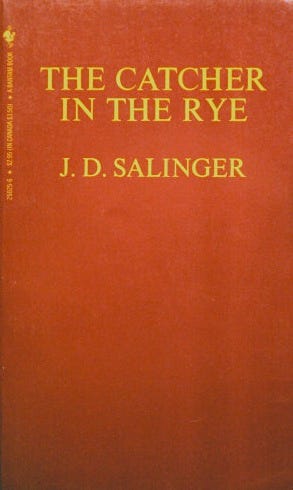Llewyn Davis and Holden Caulfield
Searching for Authenticity
Here’s a post based on this week’s episode of Fifteen-Minute Film Fanatics. We choose the films almost at random: one of us will watch (or rewatch) something and text the other guy. We then record without any previous conversation, recreating the enthusiastic conversations people have in the cars on the way home from the theater. We also take requests, so leave a comment below if there’s a film you’d like us to cover. We’ve done over 250 and you can find them all here.
Ask anyone to name the protagonist of The Catcher in the Rye and you'll be told, “Holden Caulfield.” But that doesn’t mean that he’s the main character. First-time readers admire Holden for his disdain of “phonies” and love the book because they recognize Holden’s search for authenticity in a world where everyone is a liar. This is intuitive, since most of us read the novel when we’re the same age as Holden and, as we sit in the high-school cafeteria, epitomize the lines from Cracker’s “Teen Angst”:
What the world needs now is a new kind of tension
’Cause the old one just bores me to death.
But after a few readings (and a few years of experience), some of us realize that while Holden may be the protagonist, it’s his younger brother, Allie, who is the center of the book and whose death informs every syllable of Holden’s complaints:
He's dead now. He got leukemia and died when we were up in Maine, on July 18, 1946. You'd have liked him. He was two years younger than I was, but he was about fifty times as intelligent. He was terrifically intelligent. His teachers were always writing letters to my mother, telling her what a pleasure it was having a boy like Allie in their class. And they weren't just shooting the crap. They really meant it. But it wasn't just that he was the most intelligent member in the family. He was also the nicest, in lots of ways. He never got mad at anybody. People with red hair are supposed to get mad very easily, but Allie never did, and he had very red hair. I'll tell you what kind of red hair he had. I started playing golf when I was only ten years old. I remember once, the summer I was around twelve, teeing off and all, and having a hunch that if I turned around all of a sudden, I'd see Allie. So I did, and sure enough, he was sitting on his bike outside the fence--there was this fence that went all around the course--and he was sitting there, about a hundred and fifty yards behind me, watching me tee off. That's the kind of red hair he had. God, he was a nice kid, though. He used to laugh so hard at something he thought of at the dinner table that he just about fell off his chair. I was only thirteen, and they were going to have me psychoanalyzed and all, because I broke all the windows in the garage. I don't blame them. I really don't. I slept in the garage the night he died, and I broke all the goddam windows with my fist, just for the hell of it. I even tried to break all the windows on the station wagon we had that summer, but my hand was already broken and everything by that time, and I couldn't do it. It was a very stupid thing to do, I'll admit, but I hardly didn't even know I was doing it, and you didn't know Allie. My hand still hurts me once in a while when it rains and all, and I can't make a real fist any more-not a tight one, I mean--but outside of that I don't care much. I mean I'm not going to be a goddam surgeon or a violinist or anything anyway.
Holden’s grief, anger, and guilt over surviving Allie are found in every syllable of the book. This passage epitomizes all of his futile attempts to strike back at the injustice of the world and acknowledgement—backpedaled with the affectation of not caring—of his liability to do anything about it. Salinger’s most famous creation is not a rebel without a cause: Allie is the sun around which he orbits; his self-loathing, search for connections, and prodigious profanity are aftershocks of that summer in 1946. As Lee Chandler (Casey Affleck) says of his own grief in Manchester by the Sea, “I just can’t beat it.” T. S. Eliot taught us the useful phrase “objective correlative” to help us think about why characters (and people) behave as they do: “a set of objects, a situation, a chain of events” become, in the best works, “the formula of [a] particular emotion.” Allie’s death—not generalized “teen angst”—is the objective correlative that explains Holden Caulfield.
Inside Llewyn Davis (2013) operates in a similar way, with a protagonist who is not the main character and whose actions are explained by that character’s absence. Like Holden, Llewyn is at times very funny and at others a jerk. The possible mother of his child tells him, “You're like King Midas’s idiot brother—everything you touch turns to shit” and she’s not wrong. He’s a mess. Yet, as with Holden, he’s often likable and the viewer sides with him in his attempts to capture a cat or a record deal. But the way he most resembles Holden is when we learn that he, too, is wrestling with a loss that he cannot beat.
Like Salinger, the Coens insert this vital backstory in one or two perfect, subtle, almost offhanded moments. LLewyn used to be part of a duo with Mike Timlin and the two of them made an album, If We Had Wings. For reasons we never learn, Mike committed suicide by jumping off the George Washington Bridge. (This too is reminiscent of Salinger: Roland Turner (John Goodman) tells Llewyn, “You throw yourself off the Brooklyn Bridge, traditionally.” Another attempt at a grand gesture—like breaking the car windows—falls flat.) As a solo act, Llewyn has the chops: the performances in the film are the best thing about it. But he sabotages every chance he has to make a connection or career. Watching the film is like reading Catcher in that we are privy to the aftershocks of grief. The strength of each work is that this grief—the objective correlative—takes up statistically very few of the pages or frames but is there in every moment. Just as Salinger gives us one scene in which the objective correlative is casually revealed (Holden’s roommate asks him to write an essay for hm and Holden’s mind drifts to Allie’s baseball mitt), the Coens give us this, in which Llewyn hears one false note and the grief he tries to keep at bay unexpectedly, for the characters and the viewer, manifests itself in anger:
Robert Frost said he had a lover’s quarrel with the world, but Holden and Llewyn are itching for a real fight and both of them get their asses kicked, literally and figuratively, during lost weekends in Manhattan. They both seek authenticity, the seeming cure for what ails them, but can’t get out of their own ways in order to find it.






I never thought of that (for either Catcher or Llewyn). Good article.
I just used the opening of Catcher as an example of an opening line, in a post of mine, coincidentally enough.
Great post Dan the Man. I taught Catcher and one of my smartest and sweetest students said she wanted to date Holden!